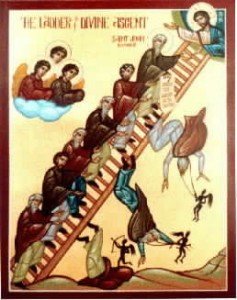 I would continue some remarks on St. John’s 27th Step, STILLNESS. One of the key principles of Christian life is that we don’t maintain Christian attitudes out of hatred for our world, but that we are striving to be more like Jesus Christ. You will recall that when Jesus was falsely accused, He stood silent before His accusers. He only spoke when He silence would mean rejecting His attitudes about life and the world.
I would continue some remarks on St. John’s 27th Step, STILLNESS. One of the key principles of Christian life is that we don’t maintain Christian attitudes out of hatred for our world, but that we are striving to be more like Jesus Christ. You will recall that when Jesus was falsely accused, He stood silent before His accusers. He only spoke when He silence would mean rejecting His attitudes about life and the world.
If we seek solitude not because we love prayer and yearn for union with God, but simply because we like to be alone or because people annoy us, then solitude, instead of helping our spiritual life, will hinder it. If we find our passions are not diminished after spending time in solitude, then we are not practicing stillness, only aloneness. The following are signs of stillness practiced wrongly – poverty of spiritual treasures, anger on the increase, a growth of resentment, love diminished, a surge of vanity.
This is why St. John says the life of stillness, especially when practiced by solitaries, must be guided by conscience and common sense.
Before we acquire stillness, crowds and cities can be frustrating and noisy places for us, but whoever acquires perfect stillness can be at peace anywhere: Do not be afraid of loud nonsense. The spirit of mourning is neither afraid of it nor upset by it.
What can we, who live in the world, do to acquire stillness? There is not one single way for everyone. Some work to reduce the passions. Others sing psalms and spend time in prayer. Some turn to contemplation. But whatever the situation is, let it be investigated in accordance with the ladder and accepted in the Lord.
Some find peace and stillness in reading, others in handiwork or art, yet others in music. Each of us must work to find stillness in our own way. It is a matter of wanting to achieve stillness.
